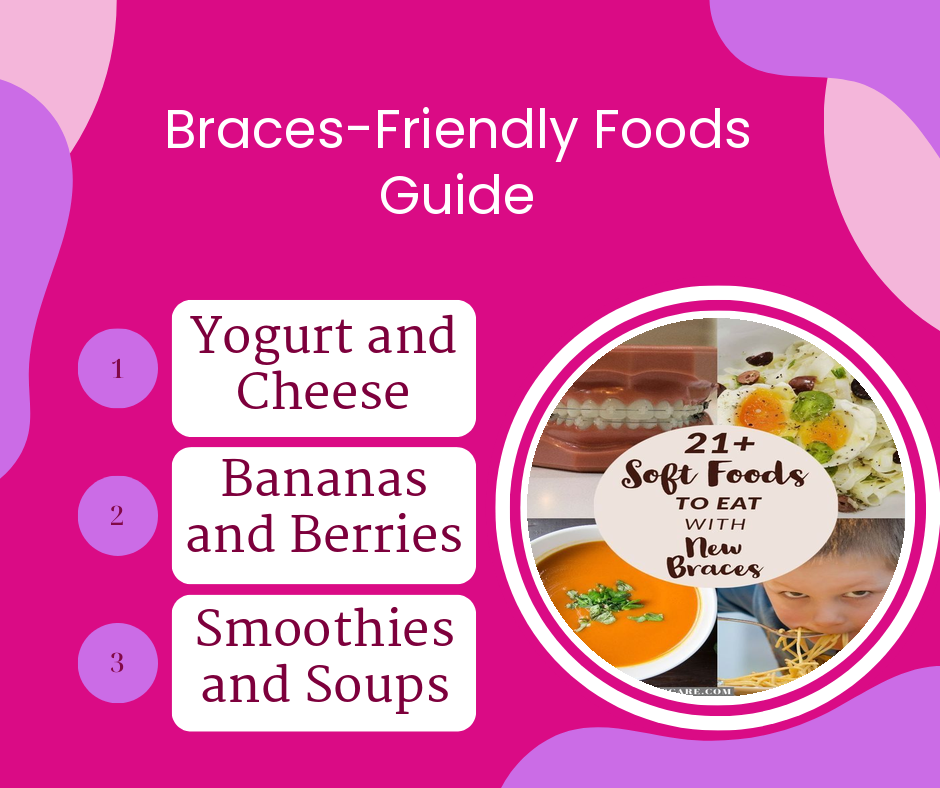Getting braces is an exciting step toward achieving a perfect smile. However, it’s essential to adapt your diet to care for them properly. Braces are a considerable investment of time and money, and neglecting dietary changes can lead to damages or setbacks. Foods to avoid with braces include those that can harm the brackets or wires, leading to delays in your treatment. This guide offers helpful tips for keeping your teeth and braces safe while you enjoy a variety of foods. Both those new to braces and their loved ones can benefit from this information on how to properly maintain this important orthodontic treatment.
Understanding Your Braces and Why Food Choices Matter
Braces work by gently and gradually adjusting your teeth into proper alignment. They’re made of delicate brackets and wires that can be easily damaged by certain foods. Braces and food choices are closely linked because eating the wrong things can break or loosen parts of your braces, lengthening your treatment time.
Proper care not only ensures that your treatment doesn’t take longer than necessary but also that your mouth remains healthy. Chewing on foods that are not appropriate can lead to broken brackets or bent wires. Both make braces less effective. Making informed choices about what goes into your mouth can make a real difference.
The Big Offenders: Foods to Avoid Entirely
There are several foods you can’t eat with braces that pose a serious threat:
- Sticky and chewy foods like caramels or taffy can pull brackets off your teeth.
- Hard and crunchy foods such as nuts or popcorn can break wires.
- Tough and chewy breads stand a chance to weaken or tear off braces.
For those who enjoy traditional diets, consider this a chance to explore alternatives. For example, instead of hard tacos, try soft tortillas that won’t harm the hardware.
Avoiding these foods to stay away from with braces will help protect your investment and ensure that your treatment stays on course.
Foods to Approach with Caution: Fruits, Veggies, and Snacks
While many fruits and vegetables are healthy, some can be tricky. Apples and carrots, for example, are hard and need to be cut into small, manageable pieces when eaten. Grapes and cherries with pits can also be an issue. When it comes to snacks like bread or chips, be mindful about how you handle them.
- Break bread into small pieces instead of biting directly into it.
- Periodically check for chips that can get stuck and lead to decay.
Be mindful of what can’t you eat with braces as accidents can happen. Aim to chew slowly and with intention, as it reduces the risk of accidents with your braces. This mindful eating can also curb bad habits like emotional eating.
Safe Foods and Smart Choices
There’s good news! Many tasty options remain when you’re wearing braces. Foods to eat with braces can include soft items like:
- Yogurt, cheese, and hummus
- Soft fruits like bananas and berries
- Smoothies and soups
These softer choices help you maintain your diet while caring for your braces. Remember to prioritize nutrients vital for both braces and overall dental health.
For busy days, consider simple, braces-friendly meals. Parents, athletes, and teens need not worry about limited options as plenty of alternatives exist to make life easier while keeping those braces safe.
Tips for Dining Out and Handling Mishaps
Eating out becomes part of the fun even with braces. Opt for meals that promise gentleness to your braces’ hardware, like pasta dishes, grilled proteins (without the bone), or rice options. Here are some tips:
- Choose softer options like mashed potatoes instead of fries.
- Go for sandwiches that allow you to control the size of each bite.
In case of accidents—say a wire breaks or a bracket comes loose—don’t panic. Here’s what to do at home until you can see your orthodontist:
- Rinse your mouth with warm salt water to prevent irritation.
- Use orthodontic wax to temporarily cover any sharp areas that cause discomfort.
- Contact your orthodontist for guidance and to schedule a repair.
Remember, the challenges braces present are temporary. The journey to a perfect smile requires some adjustments and care, but the results promise a lifetime of confidence and dental health.

